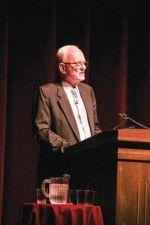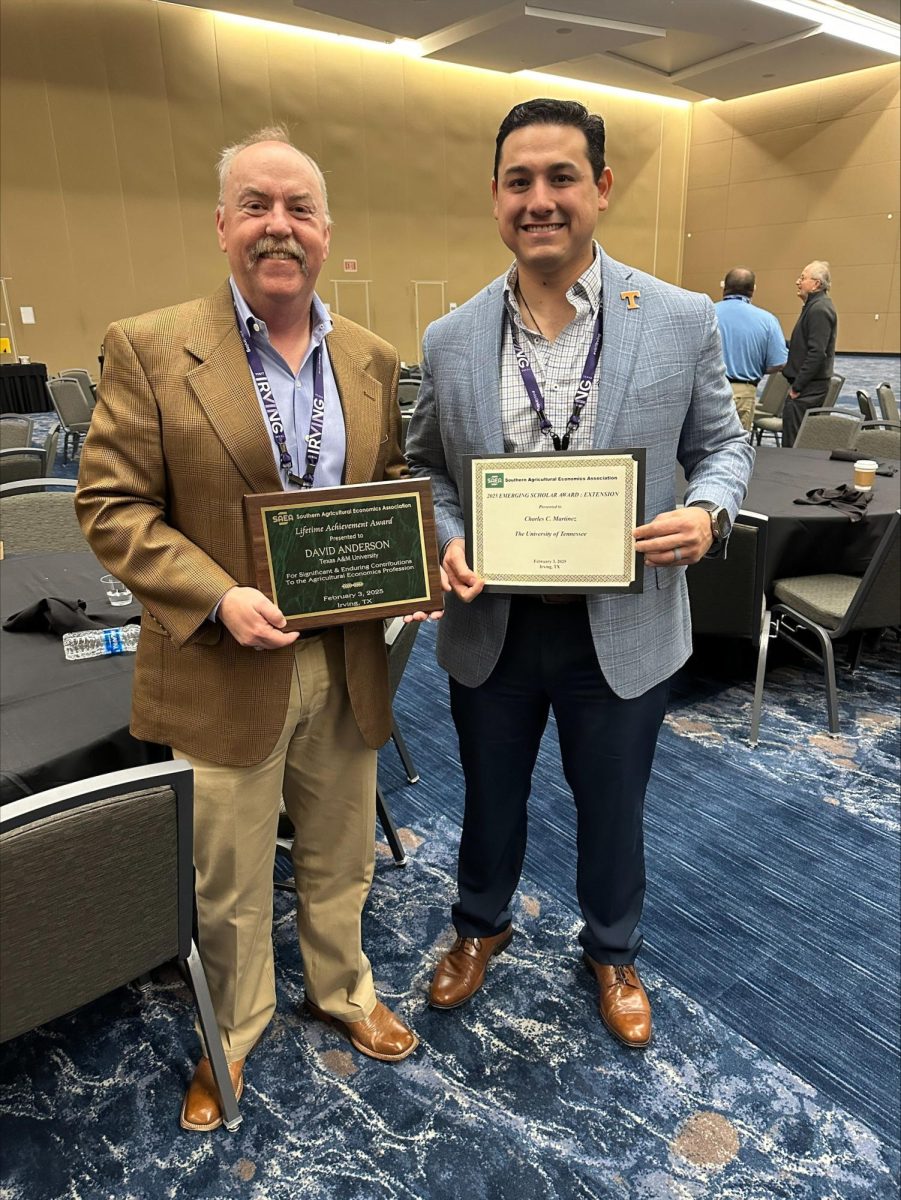Students and visitors caught a glimpse of the complex and deadly world of counterintelligence Monday evening at “Spy Games: The Art of Counterintelligence” as two espionage experts discussed security issues the U.S. faces at home and abroad.
James Olson, former chief of counterintelligence at the CIA and senior lecturer at Texas A&M’s Bush School, and Michael Waguespack, former senior counterintelligence executive with the FBI, described how the U.S. faces a threat rarely seen or heard of by the public – spying.
“There are friendly countries, but there are no friendly intelligence services,” Olson said.
Olson and Waguespack described a world hidden from the public, where countries use sophisticated spy networks to steal U.S. political and technological secrets and to compromise U.S. spy networks abroad.
Olson named China, Russia and Cuba as the primary threats in U.S. counterintelligence.
“Never in my memory has our country been more in peril at home and abroad than it is right now,” Olson said.
Olson said foreign intelligence agents use a wide variety of covers to seek U.S. intelligence, from business and diplomatic covers to student identities. Olson said the Chinese, for example, have gained access to U.S. nuclear weapons data and sophisticated technology that has allowed them to upgrade their combat aircraft and submarines to levels more advanced than their domestic technology would allow.
“Where is the outrage? Where is the demand for action?” Olson said.
After discussing current espionage threats the U.S. faces, Olson and Waguespack discussed several former FBI and CIA agents who turned on their respective agencies and sold information to foreign governments, particularly the Soviet Union.
Both talked about Aldrich Ames, a former CIA analyst who spied for the Soviet Union and the Russians from 1985 to 1994, and his role in destroying much of the U.S. intelligence network in Moscow. Ames is serving a lifetime federal prison sentence without parole in Pennsylvania.
Ames worked under for Olsen for a time in the CIA, and Olsen said Ames’ actions resulted in the interrogation, torture and execution of many of the CIA’s most well developed intelligence agents. Olson said he holds Ames directly responsible for the death of 30 agents and said their deaths reverberated throughout the CIA on a deep emotional level that will not soon be forgotten.
“I think of Rick Ames every day,” Olson said. “I find myself looking at my watch as I look down, and seeing it’s about 6:35 p.m., and I say to myself, ‘What time is it in Pennsylvania?’ It’s 7:35 p.m. there, and I ask myself, ‘I wonder what Rick is doing right now.’ I hope he’s thinking of the lives he’s ruined, the [agents] he’s killed and the families he’s utterly destroyed.”
While Olson described counterintelligence against compromised U.S. agents from a CIA standpoint, Waguespack discussed the same events from the eyes of the FBI.
Waguespack described the intelligence fallout among U.S. espionage agencies after the extent of Ames’ betrayal was revealed and said the CIA and FBI were at odds with each other over how to best proceed. Waguespack also said the FBI was soon confronted with the possibility that their own agency held a well-placed enemy mole, as friendly assets overseas continued to disappear.
“Sources were being compromised, operations were being compromised,” Waguespack said. “Something was still out there after Ames.”
The compromised FBI agent was eventually revealed to be Robert Hanssen, who had sold sensitive U.S. secrets to the Soviet Union, then the Russians, from 1979 until his arrest in 2001.
In response to a student’s question on Edward Snowden’s actions in revealing classified NSA foreign and domestic spying techniques, both Olson and Waguespack were quick to condemn the self-professed whistleblower’s actions.
“I think Edward Snowden is a traitor,” Olson said. “He did do immeasurable damage to the security of our country.”
Waguespack echoed Olson’s sentiment and drew attention to what he described as a fine line between a true whistleblower and a traitor. Waguespack said he viewed Snowden’s actions as wrong because the espionage techniques he exposed were cleared by the highest levels of the U.S. government, and placed mistrust in the decision making ability of the three branches of U.S. government.
Former intelligence agents talk spying
April 14, 2014

0
Donate to The Battalion
$2790
$5000
Contributed
Our Goal
Your donation will support the student journalists of Texas A&M University - College Station. Your contribution will allow us to purchase equipment and cover our annual website hosting costs, in addition to paying freelance staffers for their work, travel costs for coverage and more!
More to Discover









